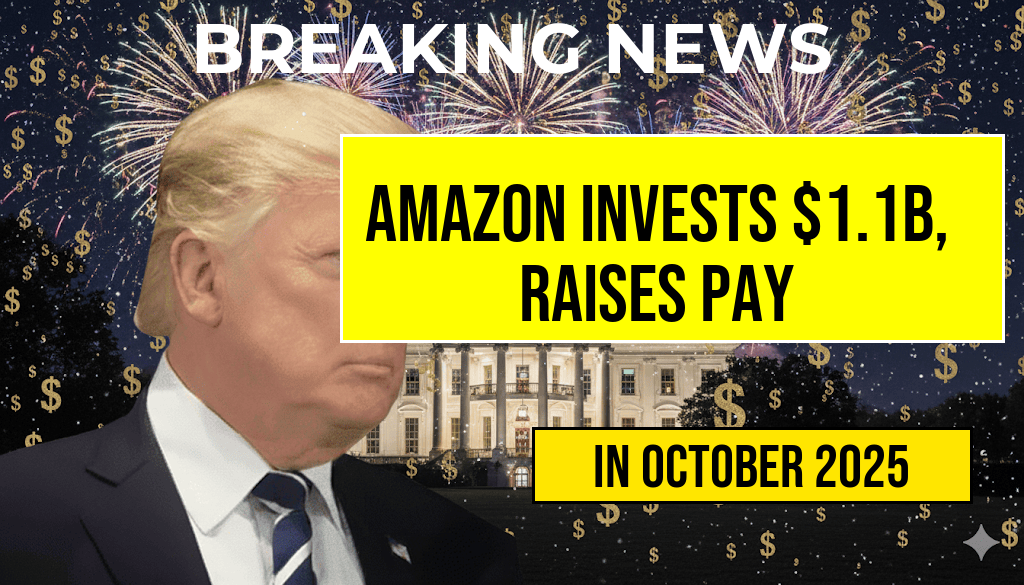Amazon announced a significant investment of $1.1 billion aimed at improving wages and working conditions for its fulfillment center employees. This infusion of capital will directly impact thousands of workers across the company’s distribution network, elevating the average pay to over $23 per hour. The move marks a strategic effort by Amazon to address ongoing labor concerns, enhance employee satisfaction, and strengthen its competitive position within the e-commerce sector. The investment also underscores Amazon’s broader commitment to workforce development amid a tightening labor market and increasing scrutiny over gig and warehouse worker compensation.
Details of the Investment and Pay Increase
Amazon’s latest financial commitment will be distributed across multiple fulfillment centers nationwide, with the goal of boosting hourly wages and providing additional benefits. According to company officials, the investment is expected to benefit more than 500,000 workers in various roles, including warehouse associates, packers, and delivery personnel. The new average pay, surpassing $23 per hour, represents a substantial increase from previous figures, which hovered around $18 to $20 per hour in many regions.
Scope and Allocation of Funds
| Category | Investment Amount | Expected Impact |
|---|---|---|
| Wage Increases | $700 million | Raises hourly pay, reduces turnover |
| Worker Benefits | $250 million | Enhanced health coverage, paid leave |
| Training and Development | $150 million | Upskilling programs and career pathways |
This strategic injection aims not only to improve immediate compensation but also to foster long-term employee retention and morale. Amazon has faced criticism over working conditions and pay disparities in recent years, prompting the company to respond with tangible financial commitments.
Industry Context and Labor Market Dynamics
Amazon’s wage hike arrives amid a shifting labor landscape marked by a tightening workforce and increased competition for skilled warehouse workers. According to estimates from the U.S. Bureau of Labor Statistics, fulfillment centers are experiencing a surge in job openings, with wages generally trending upward across the logistics industry. The company’s move aligns with a broader trend among large employers seeking to attract and retain talent through competitive pay and benefits.
Comparison with Industry Standards
- Wages: The average hourly wage for warehouse workers nationwide varies, but Amazon’s new average surpasses many regional averages, which often range from $15 to $20 per hour.
- Benefits: Enhanced health insurance options, paid leave, and career development programs are increasingly standard among major logistics firms.
- Worker Satisfaction: Recent surveys indicate that compensation improvements correlate with higher job satisfaction and lower turnover rates.
Implications for Amazon and the Broader Sector
This investment reflects Amazon’s recognition of the importance of a stable, motivated workforce in maintaining its logistics dominance. By elevating wages and expanding benefits, Amazon aims to reduce attrition and improve operational efficiency, especially during peak shopping seasons. Industry analysts suggest that such measures could set a new benchmark for compensation in the e-commerce fulfillment space.
Reactions and Industry Impact
Labor advocates have welcomed the move, viewing it as a positive step toward better worker treatment. However, some critics argue that the investment, while significant, still falls short of addressing broader issues such as workplace safety and hours expectations. Several labor unions have called for further reforms, emphasizing the need for sustained effort beyond one-time investments.
Broader Economic and Social Considerations
Amazon’s wage increase may influence wage standards across logistics and retail sectors, compelling competitors to follow suit. The move also underscores larger economic trends emphasizing wage growth as a tool to stimulate consumer spending and bolster economic stability. Moreover, it highlights the evolving expectations of workers who increasingly prioritize fair compensation and career development opportunities in their employment choices.
For more on Amazon’s labor policies and industry trends, visit Wikipedia’s page on e-commerce and Forbes coverage of Amazon’s recent wage policies.
Frequently Asked Questions
What is the total investment Amazon has made to improve worker compensation?
Amazon has invested a total of 1.1 billion dollars to enhance the pay and benefits for its fulfillment workers.
How has Amazon’s investment affected the average pay of fulfillment workers?
As a result of the investment, the average pay for Amazon’s fulfillment workers has increased to over twenty-three dollars per hour.
Which workforce segment benefits from Amazon’s pay increase?
The fulfillment workers at Amazon, responsible for handling and shipping orders, are the primary beneficiaries of the pay boost.
Does the investment include any additional benefits or improvements for workers?
While the main focus is on increasing pay, Amazon’s 1.1 billion dollar investment may also support other improvements such as better working conditions and benefits, though specific details are not provided.
How does this pay increase compare to previous compensation levels at Amazon?
The current over twenty-three dollars per hour pay marks a significant increase, reflecting Amazon’s commitment to improving worker compensation and staying competitive in the labor market.







